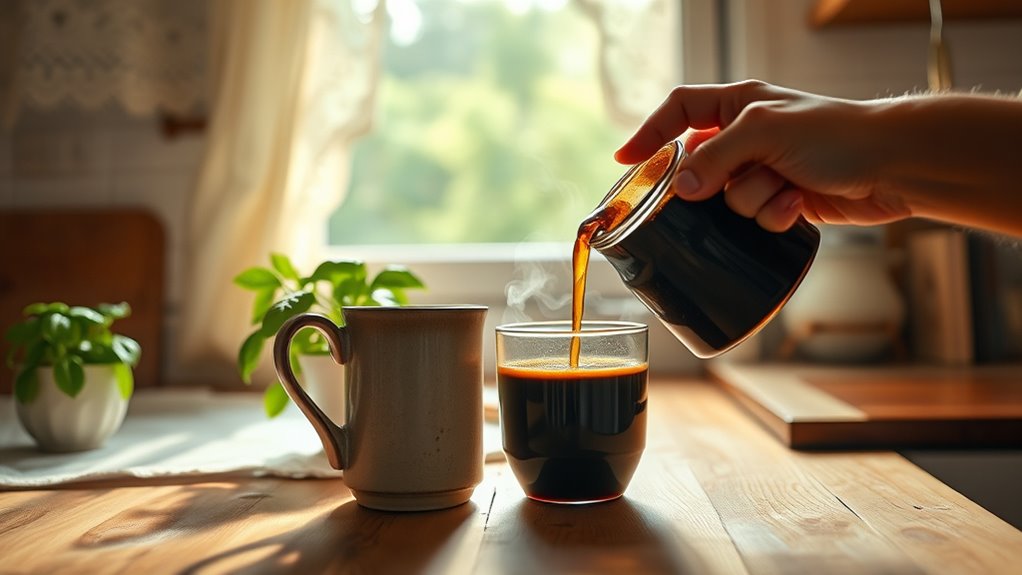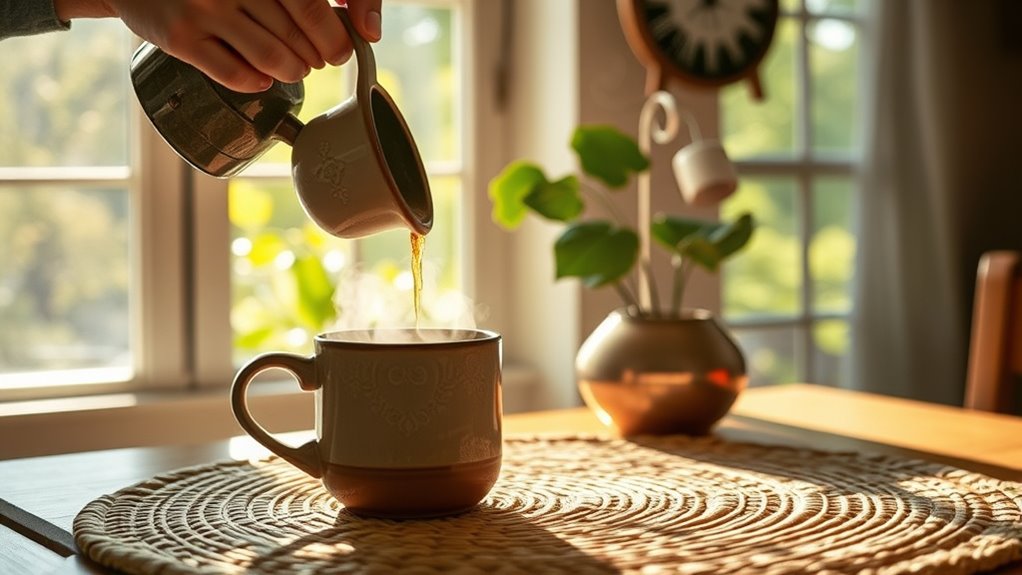Everyday rituals quietly rewire your brain, building habits that boost resilience, emotional balance, and overall well-being. When you focus fully on simple routines, you strengthen neural pathways and establish automatic behaviors that conserve mental energy. Mindfulness during these moments reduces stress and increases feelings of calm. Small consistent acts lay the foundation for long-term mental health, revealing the hidden joy of daily routines. Keep exploring how these tiny habits can transform your mind over time.
Key Takeaways
- Daily rituals strengthen neural pathways, making behaviors automatic and conserving mental energy for more complex tasks.
- Mindful routines rewire brain connections, reducing stress and fostering emotional regulation over time.
- Consistent habits reinforce neural patterns, supporting long-term mental resilience and overall well-being.
- Rituals trigger neurochemical benefits like dopamine release and cortisol reduction, promoting happiness and stress relief.
- Small, intentional routines leverage brain plasticity, gradually transforming mental landscapes and cultivating a peaceful, focused mind.

Everyday rituals, from morning coffee to evening walks, shape our brains in subtle but powerful ways. These routines aren’t just about convenience or tradition—they influence our mental health, emotional resilience, and overall well-being. When you engage in consistent habits, your brain begins to adapt, strengthening neural pathways that support these actions. This process, known as habit formation, makes behaviors easier over time, turning conscious effort into automatic responses. As a result, you conserve mental energy, freeing up capacity for more complex tasks and decisions.
Daily rituals shape our brains, strengthening neural pathways and fostering mental resilience and well-being over time.
Mindfulness benefits are a significant part of why rituals matter. When you practice mindfulness during your daily activities—paying full attention to the sensation of your coffee or the rhythm of your footsteps—you train your brain to stay present. This focused attention rewires neural connections, reducing stress and increasing emotional regulation. Over time, these mindful routines help you develop a calmer, more centered outlook, making it easier to handle life’s inevitable ups and downs. The more you integrate mindfulness into your rituals, the more natural it becomes to maintain mental clarity and emotional balance throughout the day.
Your brain thrives on consistency. When you establish a daily ritual, it creates a predictable pattern that reinforces neural pathways associated with that activity. For example, if you decide to meditate every morning, your brain begins to associate that time with calmness and focus. With repeated practice, it becomes easier to slip into a state of mindfulness without deliberate effort. This automaticity is what makes habit formation so powerful: once a behavior is ingrained, it requires less conscious thought, freeing your mental resources for other pursuits. Over time, these small, intentional rituals accumulate into a foundation for long-term mental health and resilience.
Neuroscience shows that the benefits of these routines extend beyond mental clarity—they also influence your body’s stress response. Regularly engaging in mindful rituals reduces cortisol levels, helping you feel calmer and more centered. Plus, the satisfaction of completing a daily habit boosts dopamine, reinforcing the positive feelings associated with your routine. This creates a cycle where your brain rewards consistent behavior, motivating you to stick with it. When you recognize how these small daily acts can reshape your neural landscape, you’ll see them not as chores but as powerful tools for growth and well-being.
In essence, integrating simple rituals into your daily life harnesses the brain’s natural plasticity. Each mindful moment and habit formation effort plants seeds for healthier neural pathways, fostering a more resilient, focused, and peaceful mind. The hidden joy lies in knowing that these tiny, intentional acts have the potential to transform your mental landscape, one day at a time.
Frequently Asked Questions
How Do Rituals Influence Long-Term Mental Health?
Rituals profoundly influence your long-term mental health by strengthening neural pathways and enhancing memory. When you engage in consistent routines, you create familiar patterns that reduce stress and boost emotional stability. These rituals help your brain develop positive associations, making it easier to manage anxiety and build resilience over time. By reinforcing neural pathways, rituals support a healthier mental state, encouraging lasting well-being and emotional balance.
Can Creating New Rituals Improve Cognitive Function?
Creating new rituals can boost your cognitive function by strengthening habit formation and building new neural pathways. When you establish consistent routines, your brain adapts, making tasks easier and more automatic over time. This process enhances memory, focus, and problem-solving skills, ultimately improving mental agility. So, by intentionally developing rituals, you actively engage your brain’s plasticity, fostering better cognitive performance and long-term mental resilience.
Are There Cultural Differences in the Neurological Effects of Rituals?
Imagine walking through vibrant markets where cultural symbolism colors every gesture—your brain responds uniquely to these rituals. You might notice that cultural differences influence the neurological diversity in how rituals activate reward pathways and create emotional bonds. These varied responses enhance connection and meaning, proving that cultural context shapes your brain’s reaction. Embracing this diversity enriches your understanding of how rituals, rooted in tradition, impact your neural landscape differently across cultures.
What Role Does Mindfulness Play in Everyday Rituals?
Mindfulness enhances your daily rituals by helping you stay present and focused. When you incorporate meditation benefits into routines like morning coffee or evening walks, you deepen their significance. Ritual symbolism, such as lighting a candle or saying a mantra, reinforces mindfulness, making each moment more meaningful. This practice strengthens neural pathways, boosts your emotional well-being, and transforms ordinary activities into powerful opportunities for connection, reflection, and serenity.
How Quickly Can Rituals Positively Impact Mood and Stress Levels?
Think of your mood and stress levels like a garden—quickly blossoming or wilting. You may notice positive changes within minutes to hours through mindfulness enhancement and ritual consistency. When you engage in meaningful rituals regularly, your brain rewires itself, helping you feel calmer and more centered fast. Consistency is key; it’s like watering your garden daily, turning fleeting moments into lasting peace and joy.
Conclusion
Embrace your daily rituals as the quiet anchors in your life’s ocean, guiding you through storms and calm alike. These simple acts are like seeds planted in your mind, blossoming into moments of clarity and joy. By honoring them, you nurture a garden of stability within, where peace and purpose grow. So, cherish each ritual as a sacred thread woven into your story, transforming everyday routines into powerful symbols of your inner strength and resilience.









